Dortmund, 07/04/1998
Round 8 [Svidler, P]
1.e4 e5 2.Nf3
Nc6 3.Bb5 a6
4.Ba4 Nf6 5.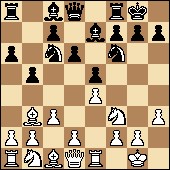 Bb7 10.d4 Re8 11.Ng5 Rf8 12.Nf3 Re8 13.Nbd2 Bf8 14.d5 Nb8 15.Nf1 Nbd7 16.Ng3 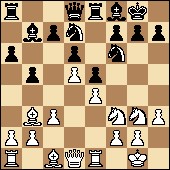 Rc8 As far as I know, this is a novelty. 16...g6 and 16...Nc5 were played numerous times before. 17.Nh2 I decided to go for the most standard reply. Other possibility was | ||
| [17.a3!? , trying to keep the bishop on the a2-g8 diagonal,] | ||
| [while 17.a4 Nc5 18.axb5 axb5 19.Bc2 | ||
|
(19.Ba2 Ra8 | ||
| 19...c6 20.b4 Ncd7 | ||
|
(20...Na4 21.Bxa4
bxa4 22.c4 | ||
| 21.dxc6 Rxc6 leads nowhere.] | ||
17...Nc5 18.Bc2
c6 19.dxc6 Bxc6 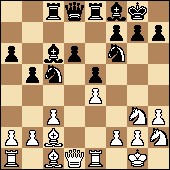 20.Bg5 | ||
| [20.Ng4 I liked less on general grounds: in the inevitable (I thought) fight for the d5-square the knight on e3 will be of more use than a bishop.] | ||
|
20...g6? A highly unusual strategic approach,
not likely to be seen again. Black probably wants to keep the h6 square for his bishop in lines like | ||
|
[20...h6 21.Bxf6
Qxf6 22.Ng4 Qd8
23.Ne3 with a very slight edge. | ||
| (23.Nf5 h5! is no good)] | ||
|
But the remedy turns out to be far worse than the dicease. 21.Ng4 Be7 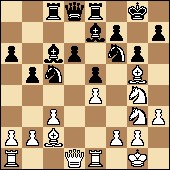 22.Nh6+ Kf8 Actually the only move. | ||
|
[22...Kg7 seems to lose by force: 23.Qf3 Ne6 24.Nhf5+ gxf5 25.Nxf5+ Kg6 | ||
|
(25...Kf8 26.Nxe7
Nxg5 27.Qxf6 | ||
| 26.Bxf6 Bxf6 27.Qg3+ Bg5 28.Rad1! | ||
|
(28.h4 is also quite good: 28...Rc7 29.Rad1 Rd7 30.Rd2! | ||
|
28...Kf6 29.Rxd6
Qc7 30.h4
Bh6 31.f4!! | ||
|
23.Qf3 At first I thought I was winning
easily with | ||
| [23.Bb3 Ne6 | ||
|
(23...d5 24.Bxf6
Bxf6 25.Bxd5 | ||
|
24.h4 , and all I need now is to
play Qf3, and Black will never have any moves at all. But then I discovered 24...Ng8 and decided to look for something else. I found it, but it was also possible to look deeper in this line: 25.Qf3 | ||
|
(25.Bxe6 fxe6
26.Qf3+ Kg7
27.Qf7+ Kh8 | ||
| 25...Nxh6 | ||
|
(25...Nxg5 26.hxg5
Nxh6 27.gxh6
f5 28.Nxf5
gxf5 29.Qh5
d5 30.exd5 | ||
| 26.Bxh6+ | ||
| (26.Bxe6 Bxg5 27.Bxc8 Bxh4 , and I am not at all sure White is so much better here.) | ||
26...Kg8 27.Nf5 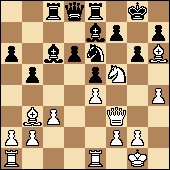 Bxh4 | ||
| (27...Bf6 28.Nxd6) | ||
|
28.Ng7! (that's the move I failed
to find at the board) 28...Re7 29.Nxe6 Rxe6 | ||
|
(29...fxe6 30.g3 | ||
|
30.Bxe6 fxe6 | ||
|
23...Bd7 | ||
|
[23...d5 is bad in view of the simple 24.Rad1 | ||
|
[and after 23...Ne6 24.h4 successfully
stalemates Black again, since 24...Kg7 is always met by 25.Nhf5+] | ||
24.Red1! It is very important to keep
the ... a2 pawn protected!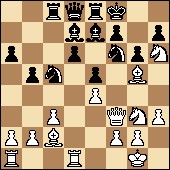 24...Rc6 | ||
|
[24...Be6 loses: 25.Ngf5!
gxf5 26.exf5
Bd7 (Black would, of course, prefer a2,
but it's unavailable) | ||
|
(26...Bc4 27.b3
Bd5 28.Rxd5
e4 29.Qd1 | ||
| 27.Qg3! Ng8 | ||
|
(27...Nce4 28.Bxe4
Nxe4 29.Bxe7+
Kxe7 30.Qh4+
Kf8 (30...Nf6
31.Ng4 | ||
| 28.Bxe7+ Nxe7 29.Rxd6 Rc6 | ||
|
(29...Qc7 30.Rf6 | ||
| 30.Rad1 | ||
|
(30.Qxe5 is also good enough: 30...Ng8 31.Qd5 Nxh6 32.Rxc6 | ||
|
30...Qc7 31.Qxe5
Ng8 32.Qh8
Rxd6 33.Qxg8+
Ke7 34.Re1+ | ||
|
25.b4! The beginning of a very long
tactical idea. 25...Na4 26.Bb3 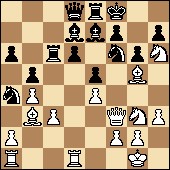 Be6 | ||
| [26...Rxc3 is bad: 27.Nxf7 Rxf3 28.Nxd8 | ||
|
(28.Bh6+ Kg8
29.Nxd8+ Rxb3
30.axb3 Rxd8
31.bxa4 bxa4 | ||
| 28...Rxb3 | ||
|
(28...Rxd8 29.gxf3
Bxh3 30.Rac1 | ||
|
29.axb3 Rxd8
30.bxa4 bxa4
31.Bxf6 Bxf6
32.Rxd6 Be7
33.Rd5 | ||
| 27.c4! | ||
|
[Here 27.Bxa4 bxa4
28.Ngf5 does not work: 28...gxf5 29.exf5 e4 30.Qg3 Bc4 | ||
|
27...Bxc4 Played very quickly, while
I thought the only move was | ||
|
[27...Nb2 , and after 28.cxb5 axb5 29.Rdc1 White is a lot better.] | ||
28.Bxa4 bxa4 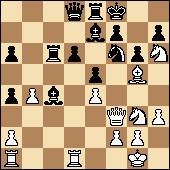 29.Rac1 Now Black has only two moves. 29...d5 The other one was | ||
|
[29...Bb5 , but it does not help: 30.Rxc6 Bxc6 31.Nhf5! gxf5 32.Nxf5 Ng8 | ||
|
(32...Nxe4 33.Bh6+
Kg8 34.Rxd6!!
Bxd6 35.Qg4+
Ng5 36.Bxg5 | ||
| 33.Bxe7+ Rxe7 | ||
|
(33...Nxe7 34.Nxd6 | ||
| 34.Rxd6 Bd7 | ||
|
(34...Qc7 35.Qg3
f6 36.Rxc6
Qxc6 37.Qxg8+ | ||
|
35.Qg4 f6
36.Nxe7 Kxe7
37.Rxd7+ Qxd7
38.Qg7+ Kd6
39.Qxg8 | ||
30.Nhf5! The point of my combination.
But now follows a sequence of shameful mistakes from both sides, seriously spoiling the game.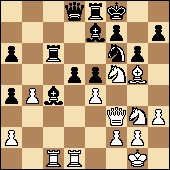 30...gxf5? | ||
|
[30...d4 was objectively stronger: after 31.Rxc4 Rxc4 32.Nxe7 Qxe7 33.Bxf6 Qe6 34.Bg5 White is better, but not winning, thou it's better not to play 34...Rxb4? 35.Qa3 Qd6 36.Bd2 Rb6 37.Qxd6+ Rxd6 38.Bb4 | ||
31.Nxf5?? Two blunders at once. I thought
this was winning, while it certainly does not, and because of that decided not to check 31.Bh6+, which
does. I found the win there two minutes later, but it was alteady too late.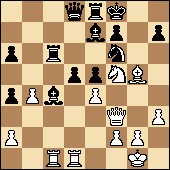 31...Nxe4! | ||
|
[I was more occupied with lines like 31...Ng8 32.exd5 Bxg5 | ||
|
(32...Rc8 33.Nxe7
Nxe7 34.d6 | ||
|
32.Bh6+ A bluff. By this time I realized
that after the planned | ||
|
[32.Bxe7+ Rxe7
33.Qxe4 Black is not forced to play 33...dxe4 34.Rxd8+ Re8 35.Rxe8+ Kxe8 36.Rxc4 | ||
|
32...Kg8?? And he did not and thus
had not played | ||
| [32...Rxh6 33.Nxh6 Ng5 , after which White will almost certainly lose.] | ||
|
33.Rxc4! Now he saw it. He sat there
for some ten minutes and then resigned and stormed away. The position is bad, but most of all, I guess,
it was intolerable for him to think about 32...Rxh6. | ||
[33.Rxc4 Rxc4 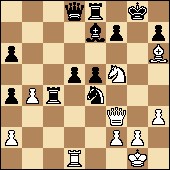 34.Rxd5!! Qc7 | ||
|
(34...Ng5 35.Bxg5
Bxg5 36.Rxd8
Rxd8 37.Qg3
f6 38.h4 Rc1+
39.Kh2 Rdd1
40.Qg4 h5
41.Qxh5 | ||
|
(34...Bg5 35.Rxd8
Rxd8 36.Bxg5
Nxg5 37.Qh5
f6 38.Qh6 | ||
| (34...Qc8 35.Nxe7+ Rxe7 36.Qg4+) | ||
|
35.Nxe7+ Qxe7
36.Qg4+ Ng5
37.Qxc4 Qf6
38.Bxg5 Qxg5
39.Qxa6 Qc1+
40.Qf1 Qb2
41.Qc4 | ||
|
1-0 | ||
